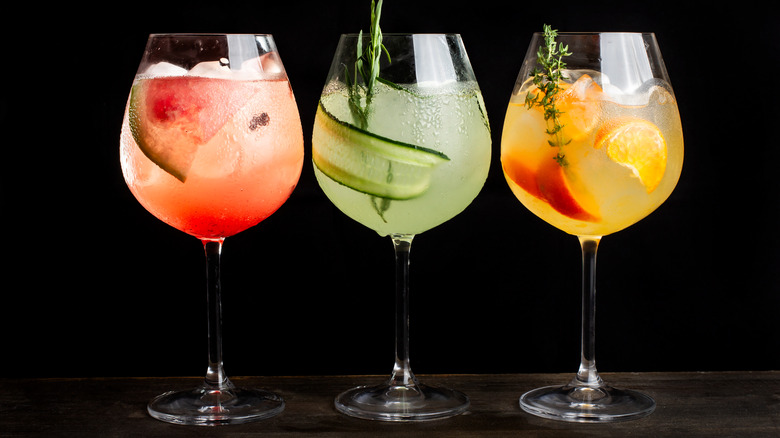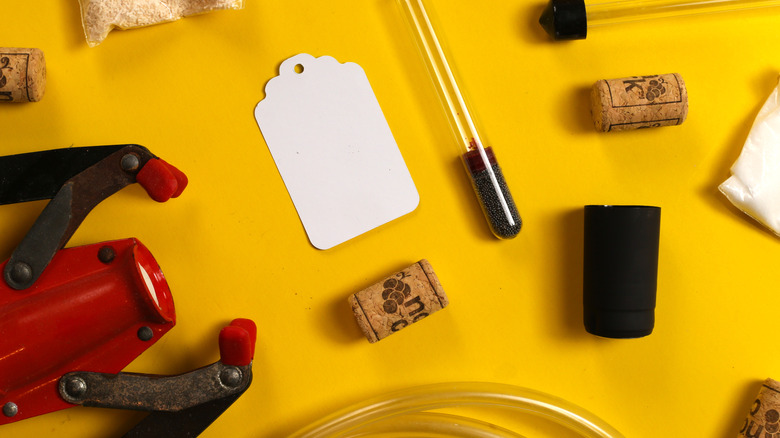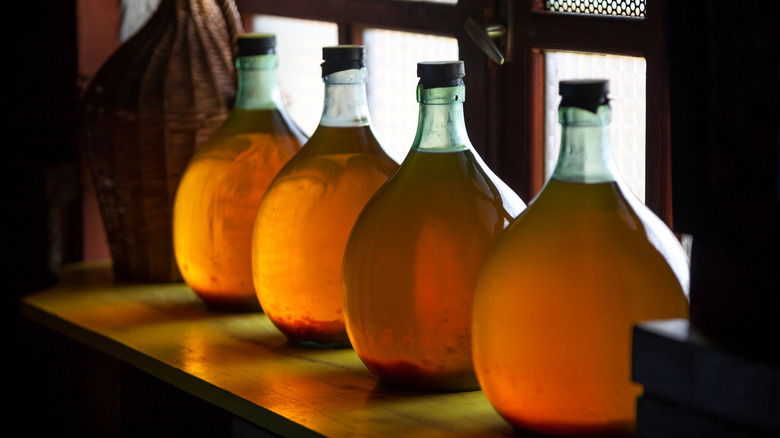Watermelon Wine Is A Great Summer Drink Alternative To Grape Vino
Nothing screams summer quite like a glass of deliciously sweet wine. Perhaps you're a little bored of the classic grape-based wine varieties out there and want to try infusing your libations with other fruits — specifically, the season's juiciest fresh fruits. If so, watermelon is one summer staple that makes for a light and refreshing boozy beverage that you should consider putting on your winemaker's checklist.
The flavor of watermelon wine can turn out to be bold and tangy or sweet and subtle depending on if you're able to score a ripe watermelon. Typically, peak watermelon season runs from May to September. This window is your best bet for finding the most flavorful fruits, and you'll want to be sure to know how to check if your watermelon is good before buying any. Using an unripe melon won't give you much flavor to work with, and you'll end up having to pair it with other fruits or added sugar to make it more palatable. That's why you should make sure to taste it before deciding if it's truly wine material. Additionally, if it's a summery, pastel pink color you're aiming for, you should aim to get the right watermelon variety for your desired hue.
After acquiring a few key ingredients and the right fermentation vessel, all you need is time, and you'll soon be sipping on the literal fruits of your labor.
Fruit wines have been around for a while
When done right, fruit wines can be a flavorful and interesting alternative to the average grape-based wines you'll crave in the summer. These creative libations have been concocted by home vintners since the Neolithic Age (around 10,000 B.C.), with recipes that likely included herbs and floral notes. Different regions and countries around the world have historically used whatever native fruits were at their disposal to infuse into their spirits. Some popular fruits used for winemaking are berries, drupes (fruits with pits or cores) like apples and plums, citrus fruits, and even some unusual tropical fruits.
Melons aren't often a home brewer's first choice when making wine because of how difficult it can be to keep the flavors intact after the fermentation process occurs. Watermelon wine can be a tricky one to get right in particular due to the fruit's high water content. Usually with country wines (another term for wine made from fruits other than grapes), acidic fruits require some level of dilution, but winemakers tend to skip this step with watermelon wine to avoid losing the flavor altogether. Other than slight tweaks like this that are based on which fruit you're using, the process for making fruit wine is very similar to the techniques used with wine grapes. The main difference is that grapes ferment on their own without any added ingredients due to the natural yeast they contain.
Equipment and ingredients you'll need for watermelon wine
Home brewing can be considered an art form, especially if you've taken the time to perfect your favorite recipes through trial and error. If you're not making wine in an Instant Pot (yes, it's a thing), you'll need to gather the right tools to get the job done. The equipment required for homemade watermelon wine includes a fermenter bucket used during the first stage of fermentation, some siphon tubing, and 1-2 carboys for the second fermenting stage. It doesn't hurt to grab some other supplies like a hydrometer, which takes a gravity reading to determine your wine's ABV percentage, and airlocks for the carboys to further lower the risk of contamination. Once you're geared up, you'll need to gather your ingredients for prepping your homemade watermelon wine.
Besides a tasty and ripe watermelon, your list of ingredients should include wine yeast, tannin powder, yeast nutrient, acid blend, a sweetener of your choice, and one Camden tablet to sterilize the juice. Acid blend can be substituted with lime or lemon juice, and you can get creative with your sweetener if you'd prefer to use granulated sugar substitutes like agave or honey. Using honey with a light color is usually the best route for making watermelon mead (aka wine made with honey), as darker varieties tend to be too strong and can knock out the light watermelon flavors.
The prep stage of making watermelon wine at home
When making your own watermelon wine, sterilization is everything. Before doing anything, you'll want to spray down all surfaces of the fermenting equipment you'll be using. An acid-based sanitizer spray solution like Star San is commonly used by home brewers to sanitize both small and large brew kit pieces as well as surfaces. Now it's the juice's turn to get purified, which is where the Camden tablet comes in. This is an optional step, but some brewers have found that the natural bacteria growth in watermelons is hard to work with without letting the tablet sterilize the juice for 24 hours. Once everything has been thoroughly rinsed, you can begin making your watermelon wine without worrying about contamination.
You'll first cube up your watermelon, then mash it by hand. You can strain it if you want less pulp, but it boils down to a liquid anyway, so this isn't necessary. Grab a large pot and fill it with your juicy watermelon puree and choice of sugar. If you're using honey, be sure to stir it more so it will dissolve fully. Once the mixture is almost boiling, remove it from the heat and mix in the other ingredients once it's cooled down a bit. Cover your concoction with a sanitized lid and let it sit for another 24 hours before sprinkling both forms of yeast into it, mixing it well, and letting the watermelon wine ferment for 5-6 days.
Watermelon wine's second fermentation stage is the longest
At this point, the fermentation process will have done 70% of its job for you, and you can check with a hydrometer to see if your wine has reached the optimal gravity reading of just above 0.990. If that's the case, you're ready to move into phase two of the watermelon winemaking process. Next, you'll siphon it very carefully into a glass carboy with a narrow neck, discarding the fermented leftover pulp and sealing the bottle with an air lock. After you've completed all the heavy lifting, now you only need to let time do its thing, and store your watermelon wine in a dark, cool environment to allow it to ferment for a few months. You can check it once or twice if you want to siphon it into yet another carboy to get it looking clearer, but you can really just let it sit for months or even years. It all depends on if you like the flavor, so you can taste-test your wine after a few months to see if it's ready to serve.
Watermelon wine may not be as sought-after or as well-known as other fruit-based booze, but if you can balance the sugar levels and the flavors, it can be the perfect lightly sweet beverage to sip on in the summertime. Plus, you'll get to say you've made it yourself, which is a pretty cool achievement on its own.




